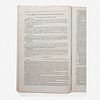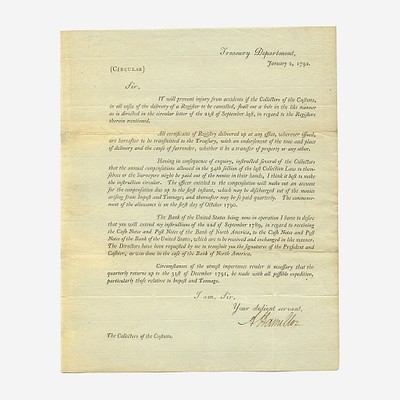[Hamilton, Alexander] [Giles Resolutions] Communications from the Secretary of the Treasury, to the House of Representatives of the United States...Re
About Seller
2400 Market St
Philadelphia, PA 19147
United States
Established in 1805, Freeman’s Auction House holds tradition close, with a progressive mind-set towards marketing and promotion, along with access to a team of top experts in the auction business. And now with offices in New England, the Southeast, and on the West Coast, it has never been easier to ...Read more
Two ways to bid:
- Leave a max absentee bid and the platform will bid on your behalf up to your maximum bid during the live auction.
- Bid live during the auction and your bids will be submitted real-time to the auctioneer.
Bid Increments
| Price | Bid Increment |
|---|---|
| $0 | $25 |
| $500 | $50 |
| $1,000 | $100 |
| $2,000 | $200 |
| $3,000 | $250 |
| $5,000 | $500 |
| $10,000 | $1,000 |
| $20,000 | $2,000 |
| $30,000 | $2,500 |
| $50,000 | $5,000 |
| $100,000 | $10,000 |
About Auction
Oct 25, 2021
Freeman's is honored to present The Alexander Hamilton Collection of John E. Herzog, a single-owner sale of Alexander Hamilton material, on October 25. Curated by Darren Winston, Head of the Books and Manuscripts Department. Freeman's info@freemansauction.com
- Lot Description
[Hamilton, Alexander] [Giles Resolutions] Communications from the Secretary of the Treasury, to the House of Representatives of the United States...Resolution of the House, of the 2d of March 1793
Alexander Hamilton's detailed report responding to the "Giles Resolutions," a partisan-leveled House resolution seeking to discredit and remove him from office
"The resolutions, to which I am to answer, were not moved without a pretty copious display of the reasons on which they were founded. These reasons are before the public, through the channel of the press. They are of a nature to excite attention�to beget alarm�to inspire doubts...I feel it incumbent upon me to meet the suggestions, which have been thrown out, with decision and explicitness. And while I hope, I shall let fall nothing inconsistent with that cordial and unqualified respect, which I feel for the House of Representatives,�while I acquiesce in the sufficiency of the motives that induced on their part the giving a prompt and free course to the investigation proposed�I cannot but resolve to treat the subject with a freedom which is due to truth and to the consciousness of a pure zeal for the public interest."
Philadelphia: John Fenno, 1793. One of only 300 copies printed. Folio, 12 1/2 x 7 7/8 in. (317 x 200mm). 65 pp. Illustrated with one folding table. Disbound; all edges trimmed; light foxing and toning to title-page and text. Evans 26343; Ford, Bibliotheca Hamiltoniana 246
A rare report by Secretary of the Treasury Alexander Hamilton to the House of Representatives, issued after a series of resolutions passed by the House on January 23, 1793, calling for extensive information from him in an attempt to discredit him for impropriety, and expel him from President George Washington's cabinet (see lots 28, 29, 35).
By the end of Washington's first term, in early 1793, the partisan divide in Congress, exemplified by the intra-cabinet fighting between Secretary of the Treasury Hamilton and Secretary of State Thomas Jefferson, was culminating in outright war. With Hamilton's numerous victories enacting his financial reforms during Washington's first term, Jefferson and his allies had come to view him as a threat to the republic, nothing short of a monarchist seeking to destroy the nation. In order to save the republic from Hamilton's nefarious plans they set into motion what Ron Chernow observes as "the first concerted effort in American history to expel a cabinet member for official misconduct." Jefferson, alongside James Madison, used Virginia congressman Willliam Branch Giles as a surrogate to attack Hamilton, and had Giles submit five resolutions in the House of Representatives on January 23 calling for extensive information regarding foreign loans "improperly" used by Hamilton. The charge leveled against Hamilton was that he used foreign loans that were earmarked to repay debts on foreign accounts, especially to France, but instead transferred the borrowed money to the Bank of the United States to aid speculators. The charge, while false, was part of a larger campaign to smear his name, one that followed him throughout his tenure as Secretary. As Chernow continues, regarding the resolutions filed by Giles, "By design, these resolutions made massive, nay overwhelming, demands on Hamilton. He had to furnish a complete reckoning of balances between the government and the central bank, as well as a comprehensive list of sink-fund purchases of government debt. Some historians, including Giles's biographer, believe that Jefferson instigated these resolutions, with Madison drafting their language. Taking advantage of a short, four-month congressional session, the House gave Hamilton an impossible March 3 deadline. Republicans hoped that Hamilton's failure to comply would then be construed as prima facie evidence of his guilt..."
Hamilton, exhausted from providing Congress detailed reports concerning these same foreign loans in early January, responds in this report with an impressive and comprehensive overview of the Treasury Department, informing the House of his goal, "To evince nevertheless my readiness to do all in my power, toward fulfilling the views of the House, and throwing light upon the transactions of the department..."
By late February, days before the Congressional recess, Giles filed nine censure resolutions against Hamilton, accusing him of myriad things, including the same charge of improperly handling foreign loans that catalyzed the above report. These resolutions were struck down by the House, but it only portended the grave and ever-deepening rift within Congress, and the trouble that lay ahead for Hamilton as Secretary of the Treasury.
This report did not change the minds of Hamilton's many detractors, and more efforts in the future were made to discredit him, leading him to request the formation of a special select House Committee to investigate his department and clear his name (see lot 35).
We can locate only five copies of this report ever being offered at auction, and the first since 2002. Rare.
- Shipping Info
-
No lot may be removed from Freeman’s premises until the buyer has paid in full the purchase price therefor including Buyer’s Premium or has satisfied such terms that Freeman’s, in its sole discretion, shall require. Subject to the foregoing, all Property shall be paid for and removed by the buyer at his/ her expense within ten (10) days of sale and, if not so removed, may be sold by Freeman’s, or sent by Freeman’s to a third-party storage facility, at the sole risk and charge of the buyer(s), and Freeman’s may prohibit the buyer from participating, directly or indirectly, as a bidder or buyer in any future sale or sales. In addition to other remedies available to Freeman’s by law, Freeman’s reserves the right to impose a late charge of 1.5% per month of the total purchase price on any balance remaining ten (10) days after the day of sale. If Property is not removed by the buyer within ten (10) days, a handling charge of 2% of the total purchase price per month from the tenth day after the sale until removal by the buyer shall be payable to Freeman’s by the buyer. Freeman’s will not be responsible for any loss, damage, theft, or otherwise responsible for any goods left in Freeman’s possession after ten (10) days. If the foregoing conditions or any applicable provisions of law are not complied with, in addition to other remedies available to Freeman’s and the Consignor (including without limitation the right to hold the buyer(s) liable for the bid price) Freeman’s, at its option, may either cancel the sale, retaining as liquidated damages all payments made by the buyer(s), or resell the property. In such event, the buyer(s) shall remain liable for any deficiency in the original purchase price and will also be responsible for all costs, including warehousing, the expense of the ultimate sale, and Freeman’s commission at its regular rates together with all related and incidental charges, including legal fees. Payment is a precondition to removal. Payment shall be by cash, certified check or similar bank draft, or any other method approved by Freeman’s. Checks will not be deemed to constitute payment until cleared. Any exceptions must be made upon Freeman’s written approval of credit prior to sale. In addition, a defaulting buyer will be deemed to have granted and assigned to Freeman’s, a continuing security interest of first priority in any property or money of, or owing to such buyer in Freeman’ possession, and Freeman’s may retain and apply such property or money as collateral security for the obligations due to Freeman’s. Freeman’s shall have all of the rights accorded a secured party under the Pennsylvania Uniform Commercial Code.
-
- Buyer's Premium



 EUR
EUR CAD
CAD AUD
AUD GBP
GBP MXN
MXN HKD
HKD CNY
CNY MYR
MYR SEK
SEK SGD
SGD CHF
CHF THB
THB![[Hamilton, Alexander] [Giles Resolutions] Communications from the Secretary of the Treasury, to the House of Representatives of the United States...Re](https://s1.img.bidsquare.com/item/l/9470/9470967.jpeg?t=1MwoES)
![[Hamilton, Alexander] [Giles Resolutions] Communications from the Secretary of the Treasury, to the House of Representatives of the United States...Re](https://s1.img.bidsquare.com/item/s/9470/9470967.jpeg?t=1MwoES)











